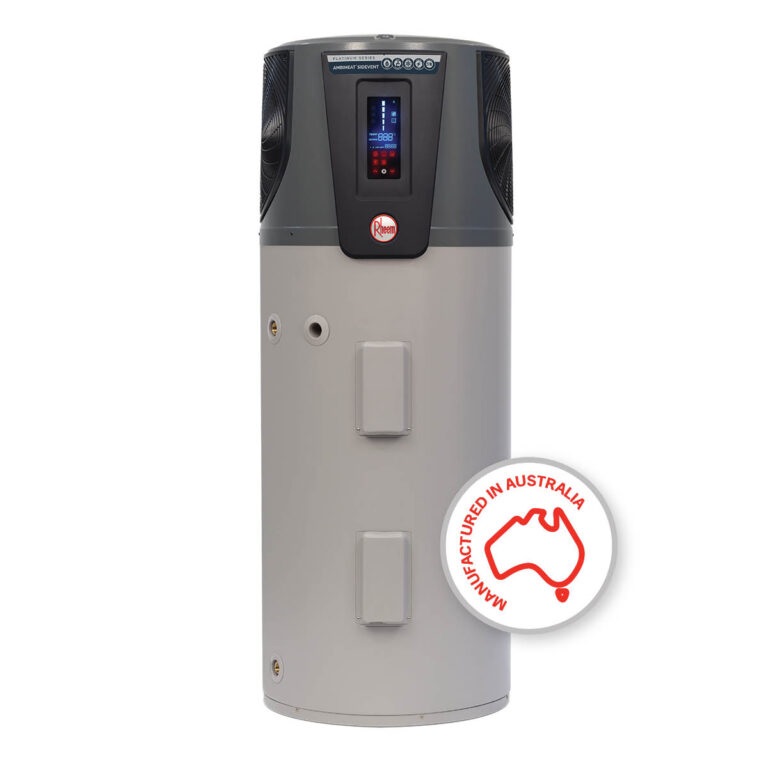The Ultimate Guide to Heat Pump Hot Water Systems
Heat pump hot water systems are becoming increasingly popular due to their energy efficiency and cost savings. Plus the Victorian government is making moves to legislate gas power out of Melbourne’s homes. For example, all new homes built in Victoria need to have electric power, not gas. So electric hot water systems like the heat pump system are becoming increasingly popular. In fact, at Harley Plumbing we have seen a tenfold increase in enquiries over installing new heat pump hot water systems.
In this blog, we will explore everything you need to know about pump hot water systems, from how they work to installation and maintenance tips. Whether you’re considering upgrading your current hot water system or installing a new one, this blog will provide you with all the information you need to make an informed decision.
How Does a Heat Pump Hot Water System Work?
A heat pump hot water system works by extracting heat from the air or ground and transferring it to the water. A heat pump harnesses renewable energy to warm your water without relying on solar panels. It extracts heat from the air and utilises it to heat your water, hence why these systems are commonly known as ‘air-source heat pumps’. Despite running on electricity, these systems are more effective than traditional gas hot water systems, offering both cost and energy savings while also lowering greenhouse gas emissions.
Heat Transfer Process
1. The system pulls outside air into the heat pump using a fan, directing it into the evaporator which contains a special refrigerant stored in the piping.
2. The refrigerant, upon exposure to the warm air, transitions from a liquid to a gas state.
3. A compressor propels the refrigerant gas through a valve, compressing it and generating heat in the process.
4. A heat exchanger then facilitates the transfer of heat from the gas pipes to a water storage tank.
Benefits of Using a Heat Pump Hot Water System

There are several benefits to using a heat pump hot water system. Firstly, they are highly energy efficient, as they only require electricity to run the compressor and fan. The heat is extracted from the air or ground, making them a renewable and sustainable option. This not only reduces your carbon footprint but also lowers your energy bills.
Secondly, heat pump hot water systems are versatile and can be installed in various locations. They can be installed indoors or outdoors, depending on the available space and your preferences. Additionally, they can be used in both residential and commercial settings, making them a flexible option for different sites.
Lastly, these hot water systems have a longer lifespan compared to traditional hot water systems. With proper maintenance, they can last up to 20 years, providing you with reliable hot water for years to come. This longevity translates to long-term cost savings and a reduced need for frequent replacements. We recommend regular servicing to keep your system running at its most efficient which saves you money and keeps the system in tip-top condition.
Factors to Consider Before Installing a Heat Pump Hot Water System
Before installing a hot water system, there are several factors you should consider. Firstly, you need to assess the available space for installation. Heat pump systems require sufficient space for the outdoor unit, as well as proper ventilation to ensure optimal performance. If you have limited outdoor space, you may need to consider alternative installation options such as roof mounting. We can let you know the best place to install your system, most likely if you are upgrading to a new system we will install the heat pump system in the same spot as your previous hot water system. For all new builds, we will advise the best spot to install.
Another important factor to consider is the hot water demand of your household. Heat pump hot water systems come in different sizes and capacities, and it is essential to choose one that can meet your hot water needs. Factors such as the number of occupants and usage patterns should be considered to ensure you have an adequate hot water supply at all times. Our systems are listed here and we can help you with choosing the best heat pump hot water system for your household.
Choosing the Right Size Heat Pump Hot Water System

Choosing the right size and capacity for your heat pump hot water system is crucial to ensure optimal performance and energy efficiency. A system that is too small may struggle to meet your hot water demands, while a system that is too large may result in unnecessary energy consumption.
To determine the right size and capacity, you must consider the peak hot water demand of your household. This can be calculated by assessing factors such as the number of occupants, usage patterns, and appliances requiring hot water. Consulting with professionals like our experienced plumbing team can help you accurately determine the appropriate size and capacity for your specific needs.
Additionally, it is important to consider the energy efficiency rating of the heat pump hot water system. Look for systems that have high energy efficiency ratings, as they will provide more cost savings in the long run. Energy efficiency ratings are often indicated by the Coefficient of Performance (COP), which measures the ratio of heat output to energy input. Aim for a system with a COP of at least 3.0 or higher for optimal efficiency.
Installation and Maintenance of a Heat Pump Hot Water System
Proper installation and regular maintenance are essential for the efficient operation and longevity of a heat pump hot water system. It is recommended to hire a professional plumber who has experience with heat pump systems to ensure the installation is done correctly. Harley Plumbing has expert knowledge in heat pumps and installation so we can get you the rebate, do the paperwork and install plus maintain your system in the future!
During installation, the outdoor unit should be placed in a location with proper ventilation and sufficient space for optimal performance. The refrigerant lines should be properly insulated to prevent heat loss, and the condensate drain should be clear to prevent any blockages.
Regular maintenance of the system is also important to keep it running smoothly. This includes cleaning or replacing air filters, checking refrigerant levels, inspecting electrical connections, and ensuring proper airflow around the outdoor unit. It is advisable to schedule annual maintenance with a qualified technician to address any potential issues and ensure the system is operating at its best. We take care of every aspect of the installation so you don’t have to worry about any of the specs. But if you have any input or questions we are more than happy to help.
Energy Efficiency and Cost Savings with a Heat Pump Hot Water System

One of the key advantages of these hot water systems is their energy efficiency, which translates to significant cost savings. Compared to traditional hot water systems, heat pump systems can reduce energy consumption by up to 60%. This not only lowers your energy bills but also reduces your carbon footprint. This is why the Vic government is moving homes to all-electric and not relying on gas to power homes.
The energy efficiency of a heat pump hot water system is measured by the Coefficient of Performance (COP), which indicates the ratio of heat output to energy input. A higher COP means a more efficient system. Heat pump systems typically have COP values ranging from 2.5 to 4.5, depending on the model and manufacturer.
In addition to energy efficiency, these hot water systems may qualify for government rebates and incentives. These financial incentives aim to encourage the adoption of renewable and energy-efficient technologies. It is advisable to check with your local government or energy provider to see if you are eligible for any rebates or incentives when upgrading to a heat pump hot water system.
Heat Pump Hot Water System Rebates
In Australia, both federal and state governments are promoting the uptake of renewable energy-powered hot water systems by offering rebates and financial incentives. Three rebates can be claimed:
2. VEECS
3. STC
By upgrading from an inefficient hot water system to a heat pump system, you may be eligible for a government solar hot water rebate. These rebates are aimed at encouraging investment in renewable energy technologies. Harley Plumbing will take care of all the paperwork and rebate applications for you. We can let you know at the quote stage how much and how many rebates you are entitled to. That way you know the out-of-pocket cost for a new heat pump water system.
Comparing Hot Water Systems
When considering a heat pump hot water system, it is important to compare it with other types of hot water systems to make an informed decision. The most common alternatives to heat pump systems are solar and gas hot water systems.
Electric resistance systems are relatively affordable to install. However, they are less energy efficient compared to heat pump systems, resulting in higher energy bills. Gas water heaters, on the other hand, are more energy efficient than electric resistance heaters but may require a connection to a gas supply. This can limit their installation options.
In terms of energy efficiency and cost savings, heat pump hot water systems outperform both electric resistance systems and gas hot water systems. They provide a more sustainable and renewable option for heating water, while also reducing long-term energy expenses.
Common Issues and Troubleshooting Tips for Heat Pump Hot Water Systems
Like any mechanical system, these hot water systems can experience issues from time to time. Here are some common issues that may arise and troubleshooting tips to resolve them:
Insufficient hot water: If you are not getting enough hot water, check the thermostat settings on the system. Adjust the temperature settings if necessary. Additionally, ensure that the heat pump system is properly sized to meet your hot water demands.
Strange noises: If you hear unusual noises coming from the heat pump system, it may indicate a problem with the compressor or fan. Contact a professional technician to inspect and diagnose the issue.
Leaking water: If you notice water leakage around the system, it could indicate a problem with the condensate drain or refrigerant lines. Contact experienced plumbers like us at Harley Plumbing to identify and fix the source of the leakage.
Remember, if you are unsure about how to troubleshoot or resolve any issues with your heat pump hot water system, it is best to seek professional help. Attempting to fix complex issues without proper knowledge and expertise can further damage the system.
Final Thoughts
Heat pump hot water systems offer numerous benefits, including energy efficiency, cost savings, and long-term reliability. By harnessing the principles of refrigeration, these systems provide an eco-friendly and sustainable solution for heating water. Before installing a heat pump hot water system, it is important to consider factors such as available space, climate, and hot water demand. Choosing the right size and capacity, as well as ensuring proper installation and maintenance, will ensure optimal performance and efficiency.
If you are still using a traditional hot water system, now is the time to consider upgrading to a heat pump system. Not only will you enjoy significant energy savings, but you will also contribute to a greener future. Upgrade to a heat pump hot water system today and experience the benefits of efficient and sustainable hot water heating.



